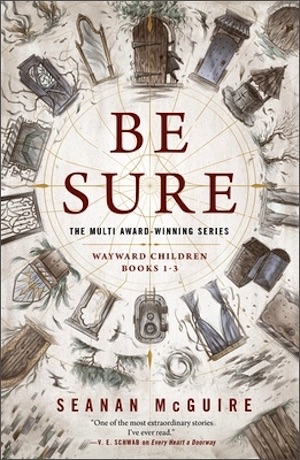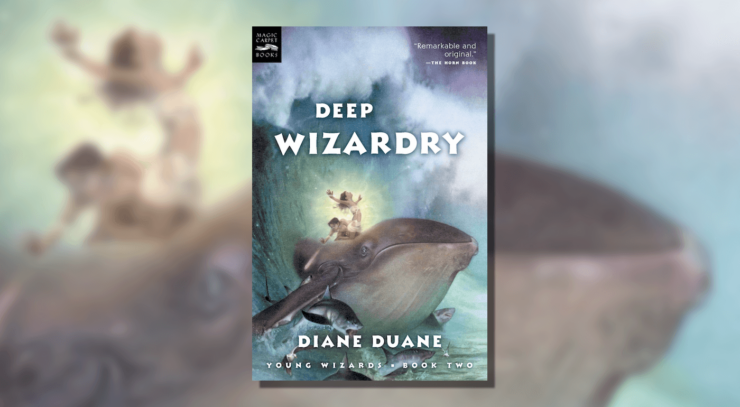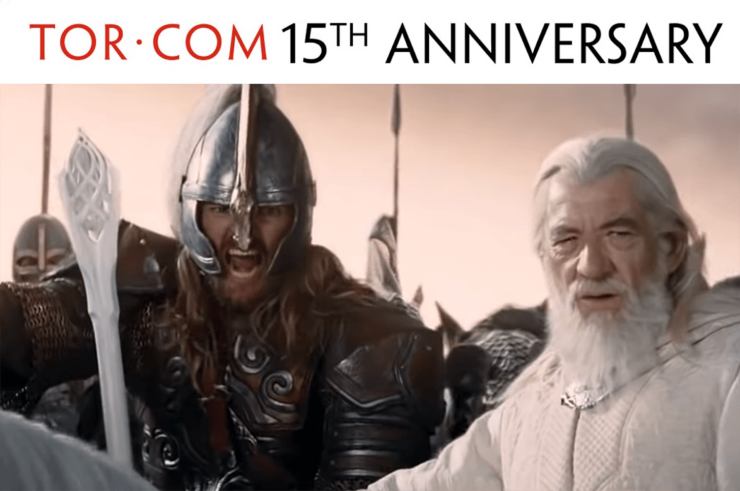Shifter romances and their urban-fantasy cousins pretty well stick to land animals (and birds, and mythical creatures of similar habitat). Sea creatures are much less common. I’ll be getting to selkies shortly, but in the meantime, I can’t pass up the opportunity to reread a classic: Diane Duane’s Deep Wizardry.
This is the second of her Young Wizards series, and was first published in 1985. Duane has updated the series in recent years, with new editions, but this volume is still the same literal deep dive it’s been for nearly forty years. It owes a perceptible debt to Madeleine L’Engle’s A Wrinkle in Time and its sequels. Star Wars was still new; Yoda pajamas were a geek-tween fashion statement. Personal computers had just barely started to show up in middle-class houses, and the universality of cell phones was still a long way off.
It’s almost a historical novel now, with its distillation of Long Island and New York City in the mid-Eighties. The Twin Towers are still standing, and still new. Maps are on paper and research is a thing you do in libraries, with paper books and card catalogues. Kids are free-range—they can go out all day, but they’d better get back by sundown or parents will send out the troops.
Young Wizards Nita and Kit have saved the universe once. Now they have to do it again, because that’s what wizards are for. Supposedly they’re on vacation—Nita’s parents have rented a cottage on Long Island Sound, and invited Nita’s friend Kit to join them. Mom and Dad don’t know that Nita and Kit are wizards, though Nita’s way-too-bright kid sister Dairine, she of the Yoda pajamas, has figured it out.
The young wizards’ vacation ends abruptly when they find an injured whale on the beach. Nita can communicate with animals—and the whale is a good deal more than that. She’s a wizard, too, and the world is in great danger again, and needs Nita and Kit to help save it.
This is a strongly dualistic universe. Wizards exist in order to protect against entropy. Entropy, and death, are the work of the Lone Power, which works on its own and through endless incarnations of itself and its slaves and servants. Every time it’s defeated, it pops up somewhere else, and wizards have to defeat it again. It never gives up, and it almost never surrenders.
This time, the threat comes from the deep sea off Long Island, far down below the surface. The wizards of the sea, who are various species of cetaceans, from the great whales to the dolphins, have to renew an ancient ritual. If they fail, the sea will erupt, and most of that part of the world will be destroyed.
The Lone Power’s servants have already destroyed the senior whale-wizard who should have been leading the Song of the Twelve. His successor is very young and inexperienced, and she’s the whale whom the human wizards find on the beach.
Nita and Kit are called to help with the Song. In order to do that, they have to shapeshift into whales. Nita does it through basically willpower, transforming into a humpback. Kit resorts to a more mechanical magic: he uses a whalesark, a cloak or shirt made from the neural net of a sperm whale. While Nita can think herself into whale shape, Kit has to put the sark on in order to shift.
Nita’s transformation can be dangerous if she forgets how to shift, but it’s based on her own mind and will, and she can control it relatively easily. Kit’s, by contrast, is imposed on him from without. The sark retains some of the personality of the whale who died to make it. He has to be extremely careful not to lose himself altogether. This is especially true when he’s under stress, and when he’s engaging in battle. Sperm whales are warriors. They live to fight against the monsters of the deep—many of whom serve the Lone Power.
Nita might not be in as much danger from her transformation, but her role in the Song more than makes up for it. She agrees to sing the role of the Silent Lord—but she forgets one important piece of advice she receives before she takes on the task. Always read the fine print. By the time she realizes what she’s actually agreed to do, she’s so deep into it that there’s no way she can really get out.
These books may present as upper-middle-grade fantasy adventure with early-teen protagonists, but light and fluffy, “kid-safe” books, they are not. They are beautifully written, deeply thought out, and they do not flinch. At all. Deep Wizardry hits me straight in the gut, and I haven’t been a tween for rather a while.
There’s plenty of kid-detail, to be sure. Dairine is the ultimate bratty kid sister. Mom and Dad are too well aware that both she and Kit are on the threshold of adolescence, i.e., puberty. They try to enforce deadlines and curfews, which cause major problems for the young wizards’ commitment to the ritual—and if they don’t participate, the death toll will be in the millions. It might anyway, if they fail, but if they let themselves be constrained by normal kid-constraints, there won’t be any ritual at all. And that will be end of Greater New York and a good part of the eastern seaboard.
In that respect this is a coming of age story. Kids grow up and assert their independence. They learn empathy by becoming members of a different species. Duane has done a lot of studying and a lot of thinking about how whales perceive the world: how their senses work, how they communicate, what it’s like to be cetacean, an air-breathing mammal who lives entirely in and on the sea.
Buy the Book


Be Sure
The heart of the book is transformation. Growing up, yes, in all its shapes and forms. Sacrifice—what it means, how it works and doesn’t work. Death, because that’s what happens to every living thing, however soon or late. And love. That, always.
As lovely as the cetacean characters are, the most powerful character of all is also the most terrifying. His name is a succession of grindings and gnashings. Nita calls him Ed, both because it’s easier to remember, and because she needs to make him just a little bit easier to bear. He’s the one participant in the Song who has no magic, and who is not a cetacean. Ed is the Master Shark, the Pale Slayer, ancient and possibly immortal, a gigantic white shark who is the personification of death.
The Lone Power may have created death, but Ed is no servant to him or to any other power in the world. Ed simply and purely is. He has one purpose: he puts an end to distress. When blood stains the water, he comes. He does what’s necessary.
No one and nothing has ever loved him, and that’s an essential part of his role in the Song. Of all the creatures Nita meets under the sea, he’s the most fearsome. And yet, in the end, she learns a great lesson from him, about death, and about love, and about the ultimate sacrifice.
This is not an easy book. It’s wonderful and powerful and terrible. It will break your heart. And I keep coming back to it, because of all the shapeshifters I’ve read and seen on screen, Duane’s whales are the most deeply felt and the most thoroughly thought through. Duane doesn’t just get it right. She’s gets it, in the fullest sense of the phrase.
Judith Tarr is a lifelong horse person. She supports her habit by writing works of fantasy and science fiction as well as historical novels, many of which have been published as ebooks. She’s written a primer for writers who want to write about horses: Writing Horses: The Fine Art of Getting It Right. She lives near Tucson, Arizona with a herd of Lipizzans, a clowder of cats, and a blue-eyed dog.















Completely agree on the power of this story, no matter the age at which you read it. I have re-read the description of the ritual many times. And yes, the shapeshifting is well portrayed, with believable cetacean POV. For me it is indeed deeper than the rest of the Young Wizards series, however enjoyable the other volumes may be. It is the only one I return to. This puts it on a relatively short list of fantasies written for kids that I have re-read more than once in adulthood.
It always makes my day (week even) when my best beloved and favorite book&series gets the honor and recognition it deserves!
And yes: this one will tear your heart (in the best ways).
I love this series. dearly, and this book possibly the most of all of them. I’ve read it multiple times, but the wonder of the deep sea, the inchoate terror that is the Master Shark, and the kick in the chest of when Nita realizes what the fine print says, all hit just as hard every single time.
I remember the first time I read DW. It was 1986 or 1987, and I was watching the TV series Starman with great attention because I loved the movie so much.
I took a break from the book and went downstairs to watch the weekly episode. We didn’t have a VCR and I knew full well that the broadcast might be the only chance I ever had to see the show (and it very nearly was).
But I couldn’t concentrate. I could not. All I could think about was the duty hanging over Nita, the apparent inevitable conclusion to the Song of the Twelve. My heart rate was up, my throat was knotted, my stomach was flipping.
I gave up, abandoned the TV, and went back upstairs to finish the story.
The show hasn’t held up too well (it’s very ’80s) but the book has. I don’t know how many times I’ve read it since, but it still hurts, every time. And heals.
(I do feel a little sorry for the squid, though.)
Most of the book lives up (down?) to its title, but for me the most remarkable single scene was Nita and Kit taking her parents to the Moon to prove that wizardry is real. There’s a vividness and sense of wonder that too many authors just can’t capture; It feels as if Duane put some of herself into Nita’s mother;
The other thing I like in this book is the part where Nita tells her parents she’s a wizard. Most secret adolescent wizard books involve a lot of lying to parents, or parents that are conveniently out of the picture. Nita’s got loving parents who want to protect her, and have reasonable expectations about behaviour, which is in direct conflict with the oath she took as a wizard. At one point, she yells back to her father “Don’t you get it? There are some things in the world more important than doing what you tell me!” There’s the young woman learning about the costs and responsibilities of power, and her parents, learning the same thing, at one remove.
High praise. This one missed me as a kid, but from what I read here, and in the comments, it sounds worth a look. Some of the best written stories are for the young. I think kids are such a powerful audience, they can be as fickle as any other reader, but when you write something that speaks to them you become a part of their life like no other piece of art ever will again.
Master Shark for the win. (weeps)
Yes! I love So You Want to Be A Wizard.
I always think of The Dark is Rising when I hear it,& vice versa, I think because I read them both around the same time.
Both are those deep, great children’s books everyone can enjoy.
Another series great about shape-shifting is Tamora Pierce’s Immortal series &, of course, Animorphs.
My daughter and I love the Young Wizards series so much! Deep Wizardry is indeed excellent, for all the reasons described, but for me, reading this series, I just couldn’t believe how Duane kept getting better with each book. She keeps topping herself! An extraordinary series for sure, with so much warmth and heart.
So much love for this series. It needs to be so much more well known than it is.
Good stuff.
The premise of the first one sounded a bit ham-handed when I first picked up the book. A bookworm kid who doesn’t fit in finds a mysterious book about how to be a wizard in the library. (Target audience: established!) I’m not sure why I started reading it– probably the first few pages drew me in.
So I was surprised to find such a good book. And of course #2 was even better.
(I didn’t like the 3rd one as much as the first two, so I stopped reading the series. Was I wrong to stop there?)
#13: Personally, I liked the first two books better than the rest, but the rest are still very good. (I didn’t much care for the fourth one, though.)
#13 As a fan it’s hard for me to objectively judge, but I’d say give it another shot. The fourth one didn’t do much for me either, but five though… The ending of that one still makes me tear up, and I am well above the age range it’s written for.
Maybe I’ll skip #4 then, and trust #5 will bring me up to speed. Thanks, all!
Oh, Ed! I have read the book multiple times over the past 30 years or so, and each time I come away with a great sense of hope. Ed is one of my favorite fictional characters of all time. He is so well written and completely believable to me. I love entire series, but this is my favorite.
I loved the original trilogy, and this one is arguably the best one. The later installments aren’t bad — I don’t think Duane could write a bad book if her life depended on it — but none of them recaptured the feeling of home that still lives in those first three.
For those thinking of reading this or later books for the first time, I would note that the print books presently available have the original text, even if the covers have changed. Hence this book being “almost a historical novel now, with its distillation of Long Island and New York City in the mid-Eighties.”
The New Millennium Edition—available from the author in electronic form—sets this book in 2008 and makes the timeline consistent in the remainder of the series. (It also makes a considerable number of minor changes to the text, though most of them will probably pass unnoticed unless you compare the two editions side-by-side.) For the most part, I’d recommend the new edition but I don’t think it makes a huge difference either way—if you only have access to the older ones, it’s fine, the actual story is the same—with two caveats.
Book #3, High Wizardry, is concerned a fair bit with a magical computer; it feels the most like a period piece of any of the old versions, I think.
More importantly, book #6, A Wizard Alone, has had the heaviest revisions: it features an autistic character, and the original edition reflects the medical establishment’s understanding of autism at the start of the century. Which was hella problematic, as it turns out. Duane got a lot of feedback about that from autistic people over the years, did a lot more research, and made it considerably better, including a significant change at the climax. If you get that far along, I strongly urge you to read the NME version.
I agree with #19 about the New Millennium Edition. Here is the link to buy the revised books, as well as many of her other books in e-format.